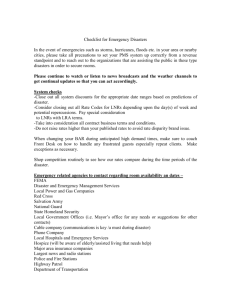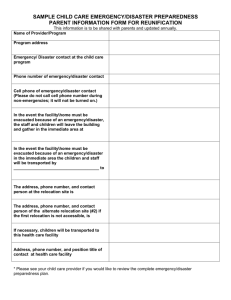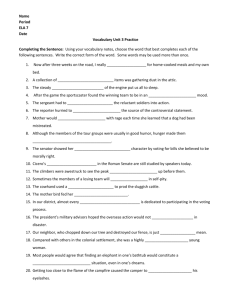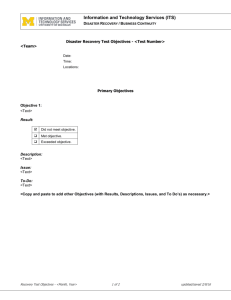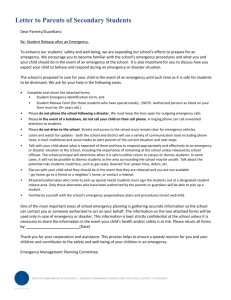Complex Emergencies Track
advertisement
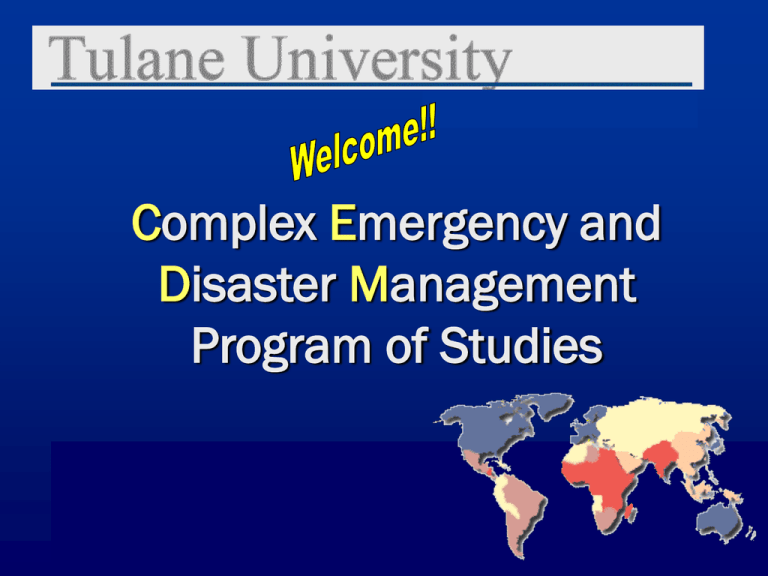
Complex Emergency and Disaster Management Program of Studies Overview Importance of problem CE/DM track development Professional skills and opportunities Research/project activities A word about this semester Importance of the Problem Trend in Global Disaster Events, 1970-99 Number of Events (Nat. Dis.) 400 120 100 80 60 40 20 0 Epidemics Natural Disasters Conflicts 300 200 100 0 1970 1975 1980 Source: CRED: Conflict Data through 1996 1985 1990 1995 Disaster Causes and Effects: We Know Where They Will Happen Humanitarian Assistance Spending Value of Humanitarian Assistance in Millions of U.S. $ 4000 Millions of Dollars 3500 3000 2500 2000 OECD Member States 1500 U.S. 1000 Source: IFRC, The World Disaster Report, 1995 1992 1990 1988 1986 1984 1982 1980 1978 1976 1974 1970 0 1972 500 Program History Increasing student involvement in CE/DM areas Strategic Planning Exercise Self Study Advisory Board of IO/NGO Executives Students to be Prepared for the Following Professional Roles Information Management Specialists Senior and Mid-Level Emergency Program Managers HPN Sector Program Coordinators Food and Nutrition Project Managers Reproductive Health Project Managers Psychosocial Project Managers Policy Analysts and Academics Key Competencies: CE/DM Program Identify the key information requirements for vulnerability and risk assessment, initial disaster assessments and monitoring and evaluation systems for CE/DM Utilize internet technology to access necessary technical expertise for CE/DM in real time settings Coordinate effectively with the international CE/DM system Key Competencies: CE/DM Program (cont) Prioritize key interventions according to disaster type, population context, and stage of disaster life cycle Design interventions programs in compliance with SPHERE minimum standards Perform a do-no-harm analysis Identify linkages between relief and development programming Develop a project or program proposal, consistent with key donor agency guidelines Key Competencies: CE/DM Program (cont) Manage personal risks such as landmines, combat situations, kidnap and hostage situations, psychological stress Research and Practice Themes Early warning research Evaluation methodologies Nutritional assessment techniques Behavioral research on post conflict and post disaster recovery transition Development of information management tools Strategic Partners Illustrative Research and Practice Programs CDMHA CERTI/Conflict Resolution MEASURE Disaster Management Initiatives Center for Disaster Management and Humanitarian Assistance (CDMHA) In partnership with the University of South Florida, the Payson Center assists in: Training, Research, and Facilitating civil-military cooperation. CDMHA also assists the public-private sector in areas vital to disaster preparedness, mitigation and response in the Americas. Disaster Management Initiatives Complex Emergency Response and Transition Initiative (CERTI) Addresses unstable conflict context of Sub-Saharan Africa Provides analytical support to USAID’s Africa Bureau Undertakes policy analysis and applied research towards more effective linkages between emergency and development programming Disaster Management Initiatives MEASURE Project USAID Global Bureau program to development monitoring and evaluation methods and provide technical support to field missions and implementing agencies Has a component to develop monitoring and evaluation tools for complex emergency and transition settings Curriculum Recommendation for Spring 2001 Biostatistics 603 and Epidemiology 603 INHL 613 Public Nutrition: Policy and Programs INHL 615 Complex Emergencies INHL 622 Program Skills for Crisis and Transition Settings INHL 714 Evaluation of Food Aid and Nutrition Brown Bag Seminars CE/DM Seminar Series Date Speaker January Paul Speigel February February March March March April April Event Response to Food Aid in Ethiopia, December 1999- June 2000 Les Roberts Case Studies from Congo and Sierra Leone Mohamed Hamza Urban vulnerability and disasters Mohamed Adeeb Logistics response for Mitch Marshall Wallace Do No Harm Analysis Krishna Kumar Role of International Politics in Emergency Aid Pat Carey Role of Human Rights in NGO Programming Marge Tsitouris Conflict Resolution and Social Reconstruction in Emergencies Additional Resources For further information about courses and programs managed by Dr. Mock, please see: Dr. Mock’s website www.tulane.edu/~mock Linking Complex Emergency and Transition Initiative www.CERTI.org Center for Disaster Management and Humanitarian Assistance www.CDMHA.org How To Get Involved Students interested in employment related to CE/DM • Work Study Certified or Willing to Volunteer • Those with Analytical/Writing/Technology Skills and/or Experience in CE/DM May be Eligible for Paid Positions A sign up sheet for those interested in work is on Dr. Mock's door



